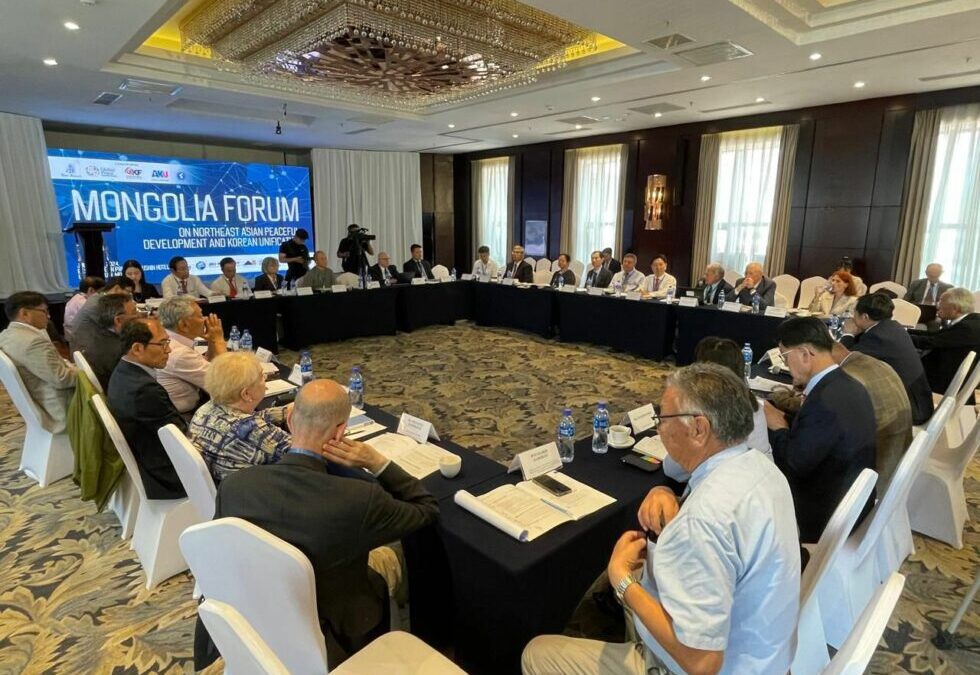Dr. Hyun Jin Preston Moon has consistently advocated for Mongolia to play a role in facilitating critical discussions about Korean reunification and other regional issues, given its friendly diplomatic relations with both North and South Korea and the many lessons Mongolia has to offer from its peaceful transition out of communism.
The following is an unofficial English translation of excerpts from coverage of the 6th Mongolia Forum on Northeast Asia: Peaceful Development and Korean Unification. The forum focused on environmental concerns while exploring opportunities for regional cooperation, promoting a departure from the current trend towards traditional Cold War-style alliances. UPI coverage of the event can be found here.
Kim Young Jin from the Korean-language news organization Weekly Chosun provides a report on the forum, which is also available here on their website (in Korean).
Original article title: “Why is the ‘unification of the Korean Peninsula’ being discussed in Mongolia?”
As North Korea persists in launching waste balloons toward South Korea and ramping up ballistic missile provocations, tensions on the Korean Peninsula continue to escalate. On June 19, North Korea signed a ‘Comprehensive Strategic Partnership Treaty’ with Russia during President Vladimir Putin’s visit to Pyongyang. In light of these security threats, the ‘Mongolia Forum’ aimed at discussing peaceful development in Northeast Asia and the unification of the Korean Peninsula took place on July 9 at a hotel in Ulaanbaatar, Mongolia.
The opening speaker emphasized the need to enhance the involvement of civil society organizations and engage the younger generation in the peaceful development of Northeast Asia. An important topic of discussion was the role of civil society in promoting the goal of a unified Korean Peninsula.
This sixth iteration of the forum was organized by ‘Blue Banner,’ a Mongolian NGO dedicated to denuclearization and co-hosted by the ‘Global Peace Foundation’ founded by Dr. Hyun Jin Preston Moon, along with the ‘One Korea Foundation’ and ‘Action for Korea United (AKU).’
Mongolia itself has experienced both division and regime change in its history. The country, often referred to as Outer Mongolia, was once divided into Outer and Inner Mongolia, with the latter incorporated into China as the Inner Mongolia Autonomous Region. Outer Mongolia became independent from China with Soviet support and was the second communist nation after the Soviet Union. In the early 1990s, it transitioned to a democracy and market economy without bloodshed, making it an influential case study for discussions on unification.
Mongolia maintains diplomatic relations with both North and South Korea, fostering traditional friendships with the North and a ‘strategic partnership’ with the South, celebrating 34 years of diplomatic relations this year. Geopolitically positioned between powerful nations like Russia and China, Mongolia pursues a policy of neutrality and balanced diplomacy.
As a ‘nuclear-weapon-free zone,’ Mongolia is not only devoid of nuclear weapons but also prohibits their use. The UN General Assembly designated it as such in 1992, and its denuclearization was reaffirmed by a UN resolution in 1998. In 2012, the five permanent members of the UN Security Council confirmed its status, solidifying Mongolia as a denuclearized country. Speakers emphasized the potential for Mongolia, with its experience in establishing a nuclear weapon-free zone, to serve as a model for Korea’s denuclearization.
At the forum, the first joint declaration summarizing discussions was unveiled, which includes commitments to promote the Mongolia Forum to build consensus around civil society goals and to establish regional mechanisms in Northeast Asia for cross-border initiatives like the Greater Tuman River Development Initiative(GTI). It also calls for realizing the Korean Peninsula’s political, economic, and cultural potential to support establishing a free and unified Korea in accordance with the Hongik Ingan philosophy, alongside efforts to enhance soft power cooperation across Asia through initiatives such as tree-planting campaigns to combat desertification in Mongolia. The declaration also aims to empower youth through the Global Peace Leadership Corps to act as significant contributors to the international community.
David Caprara, a strategic advisor at the Global Peace Foundation, noted to reporters that a mention of a ‘new clean energy platform’ was added to the declaration, which was not included in the initial draft.
Discussion also arose about the feasibility of ‘peaceful unification.’ In-taek Seo, the standing representative of Action for Korea United, noted that worsening conditions on the Korean Peninsula might actually create favorable circumstances for unification. He highlighted “anomalous signs predicting a crisis in the North Korean system,” drawing parallels to the unification of East and West Germany, which resulted from decisions made by the populace. Seo concluded that achieving a consensus on the vision for unification in South Korean society is crucial for preparing for future unification.
The ‘Camp David Declaration’ agreed upon by the leaders of Korea, the United States, and Japan last August included a commitment to ‘support a free and peaceful unified Korean Peninsula.’ With the possibility of a government change in the U.S. ahead of the presidential election, questions arise as to whether this declaration will be upheld with one speaker commenting, “When a president changes, previous policies often get overturned, but there is a chance that a new administration may continue the Camp David Declaration if it is found beneficial to the administration.”

